Números para dominar el mundo (SPA-ENG)
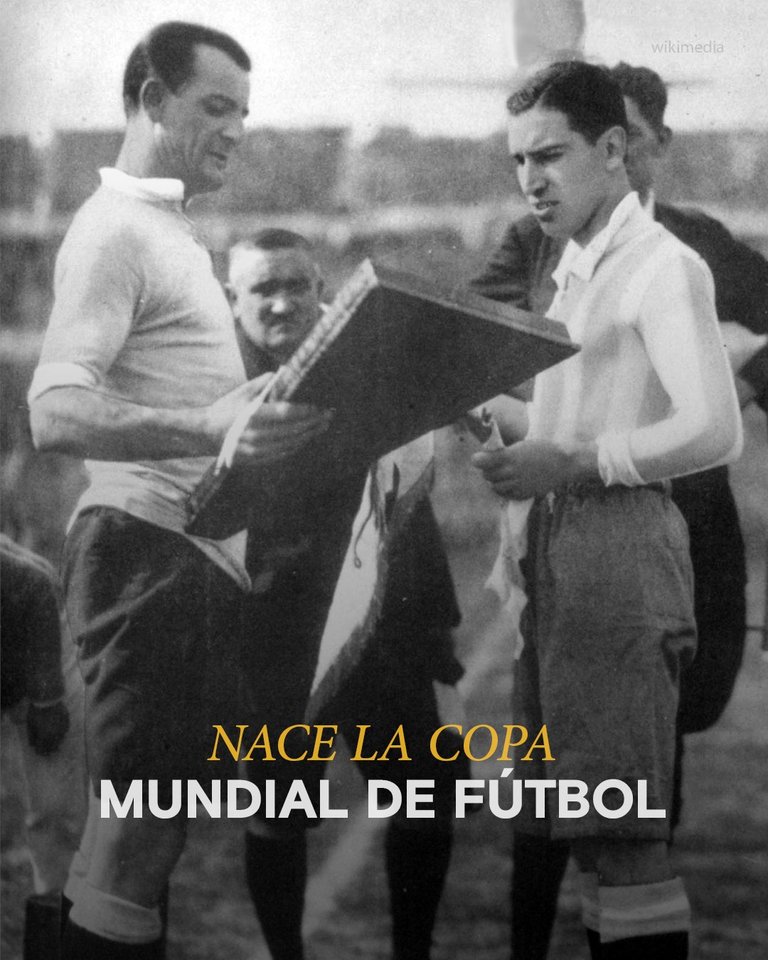
Alguna vez leí que las matemáticas dominan al mundo, quizás una aseveración algo exagerada ya que están dejando de lado en esta tajante definición a la política, por ejemplo. Para ilustrar esto puedo mencionar que conozco algunos diputados de mi país que ni siquiera tienen finalizados los estudios secundarios, dudo que las matemáticas sean su fuerte.
Pero hablando seriamente es muy cierto que, desde un punto de vista científico, el dominio de los números asegura una mayor comprensión de cómo funciona el mundo, al menos permiten ver el orden, predecir comportamientos y actuar en consecuencia.
Las estadísticas son una ciencia derivada de las matemáticas, la parte que se encarga de estudiar los datos; hacen uso del conocimiento de las ciencias exactas al que le agregan el componente de las probabilidades para crear modelos de predicción y especulación, en su uso primario sirve para dar certezas sobre hechos pasados y creo haber hablado algo de esto en una publicación anterior.
Me gusta hurgar en el pasado, principalmente en determinados deportes que me interesan, el fútbol es uno de ellos y al recopilar y analizar la historia de los mundiales he llegado a algunas conclusiones que al menos para mi resultan interesantes y quiero compartirlas con todos Ustedes.
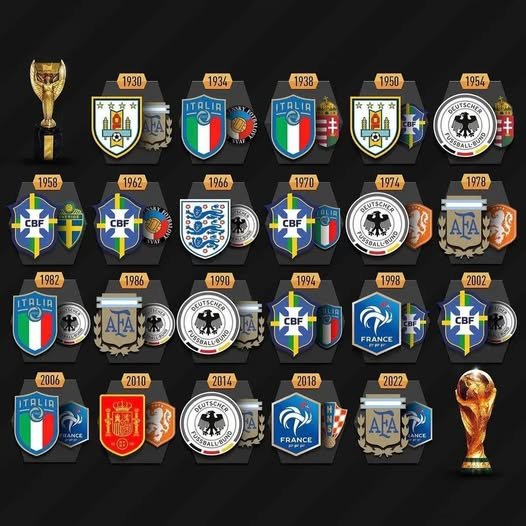
Hasta el momento se llevan desarrolladas 22 competencias ecuménicas en el deporte más popular del planeta comenzando en 1930 en Uruguay, se disputan cada 4 años y solamente dos veces no se han podido organizar, en 1942 y 1946 debido a la segunda guerra mundial.
Únicamente 8 selecciones nacionales han conseguido salir triunfantes en esta competencia que nuclea a todos los países asociados a FIFA y que son 211 en la actualidad. De esos 8 triunfadores 3 pertenecen a Sudamérica y 5 a Europa:
Uruguay (1930 y 1950)
Italia (1934, 1938, 1982 y 2006)
Alemania (*) (1954, 1974, 1990 y 2014)
Brasil (1958, 1962, 1970, 1994 y 2002)
Inglaterra (1966)
Argentina (1978, 1986 y 2022)
España (2010)
Francia (1998 y 2018)
Como pueden observar, he colocado un asterisco (*) al lado del nombre Alemania. Obtuvo sus tres primeras estrellas bajo la denominación de Alemania Federal cuando estaba dividida en dos (Federal y Democrática), solamente el último título lo consiguió como Alemania (Unificada). Alemania Federal no existe más como país y ahora es simplemente Alemania y ya que hablamos de esta condición, debemos mencionar que otro país disputó 2 finales del mundo y no existe más, se trata de Checoslovaquia que a partir de 1993 se dividió en República Checa y Eslovaquia, la primera de ella es la heredera del historial del fútbol mundialista.

De los 8 campeones mundiales solamente 2 no han podido obtener el título siendo sede del torneo, ellos son Brasil y España, curiosa circunstancia principalmente en el caso del seleccionado sudamericano ya que es el máximo ganador de este evento con 5 títulos.
Un solo país disputó 7 finales se trata de Brasil que como mencionamos anteriormente ganó 5 de ellas resignando las 2 restantes. 3 países que han disputado la final de un mundial en 6 oportunidades: Alemania, Argentina e Italia, las dos selecciones europeas han ganado 4 cada una y Argentina 3. Pese a disputar 6 finales cada uno, Italia y Argentina nunca se han cruzado en esa instancia, en cambio Alemania y Argentina se han cruzado en 3 oportunidades con dos triunfos teutones y uno de los sudamericanos.
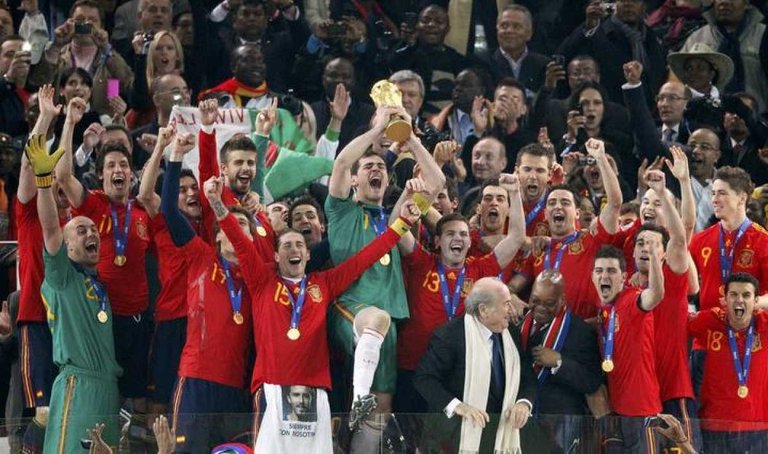
Solamente uno de los 8 campeones mundiales no ha disputado jamás un partido por el tercer puesto, Argentina.
Un solo país disputó 3 finales sin ganar ninguna de ellas, es Paises Bajos que finalizó en segundo lugar en 1974, 1978 y 2010 perdiendo con Alemania, Argentina y España sucesivamente.
Como mencioné anteriormente, Checoslovaquia disputó 2 finales del mundo perdiendo ambas, con Italia en 1934 y con Brasil en 1962 y a ella se agrega en este poco simpático halago de haber caído en 2 finales sin ganar nunca el título, Hungría, quien sucumbió ante Italia en 1938 y ante Alemania Federal en 1958.
A la lista de seleccionados que han disputado finales sin haber conseguido el título se agregan Suecia que perdió ante Brasil en 1954 y Croacia que hizo lo propio ante Francia en 2018.
Hay dos seleccionados nacionales que tienen 100% de efectividad en finales del campeonato mundial: Uruguay y España, aunque el equipo rioplatense tiene dos disputadas y dos ganadas contra una sola del conjunto ibérico.

Solo dos países han perdido finales consecutivas: Paises Bajos en 1974 y 1978 y Alemania en 1982 y 1986.
En un solo torneo ecuménico no hubo partido por el tercer puesto, fue en el primero disputado en Uruguay en 1930 y donde la selección local venció a la Argentina para quedarse con el primer título mundial de la historia.
Y hablando de encuentros por el tercer lugar, Polonia nunca ha disputado una final, pero si dos veces el match por el tercer lugar en el podio saliendo victoriosa en ambos, la primera vez en Alemania 1974 y la segunda en España 1982.
Desde la primera edición de 1930 y hasta 1982 no hubo país organizador repetido, esa constante se rompió en 1986 cuando México repitió la organización, algo que ya que había hecho en 1970; en 1990 Italia fue sede de su segundo mundial luego del organizado en 1934, este hecho volvió a repetirse en Francia 1998 (1938), Alemania 2006 (1974) y Brasil 2014 (1950). El próximo a desarrollarse en Estados Unidos en 2026 volverá a repetir sede luego de 1994 aunque en esta oportunidad el halago de ser país organizador será compartido con Canadá y México quien tendrá el curioso halago de ser sede por tercera vez.
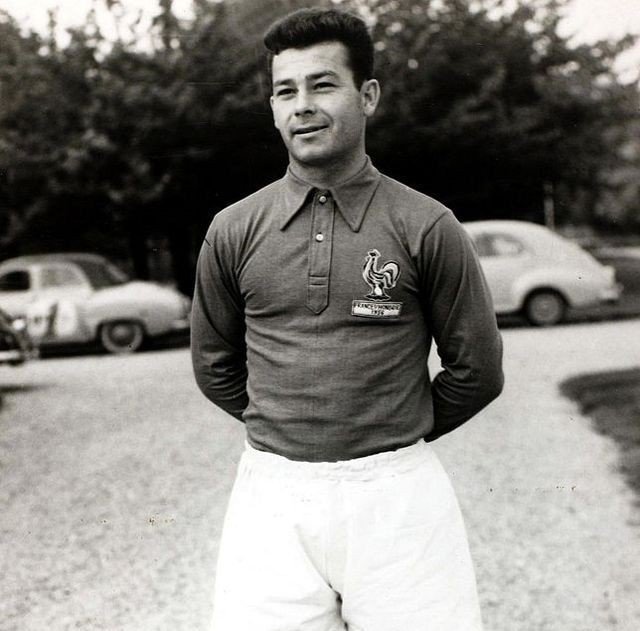
El máximo goleador en un mundial es el francés Just Fontaine quien en Suecia 1958 consiguió 13 tantos, la lista de mayores artilleros continúa con Sándor Kocsis de Hungría con 11 en 1954, Gerd Müller de Alemania en tercer lugar con 10 tantos en 1970, Ademir de Brasil y Eusebio de Portugal cuartos con 9 goles en 1950 y 1966 respectivamente y Kilian Mbappé de Francia en 2022 y Guillermo Stábile de Argentina en 1930 compartiendo el quinto lugar general con 8 conquistas. Respecto a los goleadores hay un caso extraño y digno de destacar, el ruso Oleg Salenko compartió el título de máximo artillero con Hristo Stoichkov de Bulgaria con 6 tantos en Estados Unidos 1994, lo curioso es que logró esa marca sólo en 2 encuentros correspondientes a la primera fase de grupos ya que Rusia quedó eliminado en esa instancia y en el tercer partido no convirtió.
Solo 3 seleccionados han conseguido el doble halago de coronarse campeón mundial y tener al máximo artillero del torneo, ellos son Argentina en 1978 con Mario Kempes, Italia en 1982 con Paolo Rossi y Brasil en 2002 con Ronaldo.
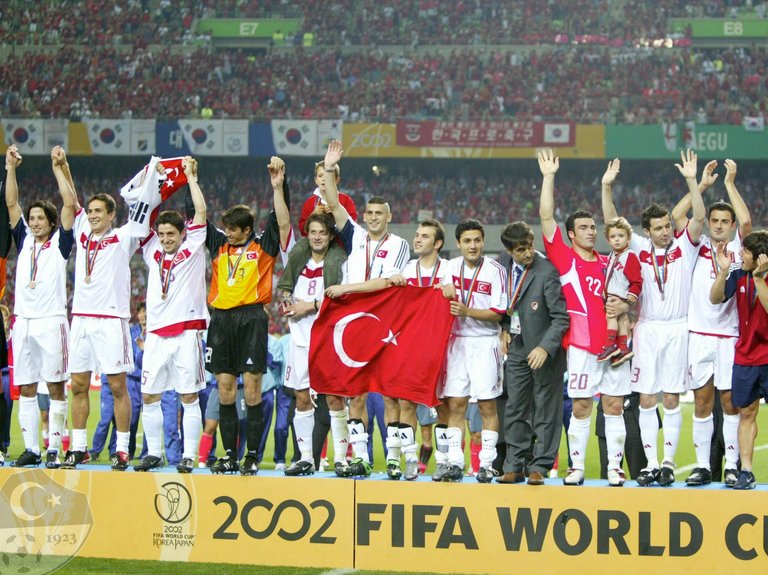
De las 22 finales disputadas 5 necesitaron prórroga para definir al campeón y 3 llegaron a la definición por penales luego de finalizado el tiempo extra sin ventaja.
El encuentro más sorpresivo por el tercer puesto en un mundial lo disputaron Turquía y Corea del Sur en 2002, seguido por el de Suecia vs. Bulgaria en 1994 y el de Croacia vs. Marruecos en 2022.
Las estadísticas muestran hechos concretos, algunos curiosos y otros que refrendan el predominio de ciertas selecciones nacionales y ciertas regiones del globo terráqueo sobre el resto del mundo; como sea, los resultados de los mundiales de fútbol disputados hasta el presente nos dan mucho por analizar, por estudiar, por concluir.
Las matemáticas y las estadísticas no tienen por qué ser aburridas, pueden ser muy divertidas y ejemplificadoras, como en este caso particular donde aplicadas a una actividad deportiva sumamente popular hacen las delicias de los que gustamos de ella.
Numbers to rule the world
I once read that mathematics rules the world, a somewhat exaggerated assertion, as politics, for example, is often left out of this categorical definition. To illustrate this, I can mention that I know some representatives in my country who haven't even finished high school; I doubt mathematics is their strong suit.
However, it's also very true that, from a scientific perspective, mastering numbers enables a deeper understanding of how the world works; at the very least, it allows us to see order, predict behavior, and act accordingly.
Statistics is a science derived from mathematics, the branch that studies data. It uses knowledge from the exact sciences, adding a component of probability to create prediction and speculation models. Its primary purpose is to provide certainty about past events, and I believe I've discussed this in a previous post.
I like to delve into the past, especially in certain sports that interest me, soccer being one of them. In compiling and analyzing the history of the World Cups, I've come to some conclusions that, at least to me, are interesting, and I want to share them with all of you.
To date, 22 ecumenical competitions have been held in the most popular sport on the planet, beginning in 1930 in Uruguay. They are held every four years, and only twice have they been unable to be organized, in 1942 and 1946, due to World War II.
Only eight national teams have triumphed in this competition, which brings together all FIFA member countries and currently numbers 211. Of those eight winners, three are from South America and five are from Europe:
Uruguay (1930 and 1950)
Italy (1934, 1938, 1982, and 2006)
Germany (*) (1954, 1974, 1990, and 2014)
Brazil (1958, 1962, 1970, 1994, and 2002)
England (1966)
Argentina (1978, 1986, and 2022)
Spain (2010)
France (1998 and 2018)
As you can see, I've placed an asterisk (*) next to the name Germany. It earned its first three stars under the name West Germany, when it was divided into two (Federal and Democratic). Only the last title was achieved as a Unified Germany. West Germany no longer exists as a country and is now simply Germany. While we're on the subject, we should mention that another country that has competed in two World Cup finals is Czechoslovakia, which, starting in 1993, was divided into the Czech Republic and Slovakia. Slovakia is the heir to the history of World Cup football.
Of the eight world champions, only two have failed to win the title while hosting the tournament: Brazil and Spain. This is a curious circumstance, especially in the case of the South American national team, which has won the most titles at this event with five.
Only one country has played in 7 finals: Brazil, which, as mentioned above, won 5 of them, losing the remaining 2. Three countries have played in the World Cup final 6 times: Germany, Argentina, and Italy. The two European teams have won 4 each, while Argentina has won 3. Despite playing in 6 finals each, Italy and Argentina have never met in that instance. However, Germany and Argentina have met on 3 occasions, with two victories for the Germans and one for the River Plate team.
Only one of the eight world champions has never reached a third-place match: Argentina.
Only one country has reached three finals without winning any of them: the Netherlands, which finished second in 1974, 1978, and 2010, losing to Germany, Argentina, and Spain in succession.
As I mentioned earlier, Czechoslovakia played in two World Cup finals, losing both, to Italy in 1934 and to Brazil in 1962. Added to this unsympathetic compliment of having lost two finals without ever winning the title is Hungary, who succumbed to Italy in 1938 and West Germany in 1958.
To the list of national teams that have played in finals without winning the title are Sweden, which lost to Brazil in 1954, and Croatia, which did the same to France in 2018.
There are two national teams that have a 100% success rate in World Cup finals: Uruguay and Spain, although the River Plate team has played two and won two, compared to just one for the Iberian team.
Only two countries have lost consecutive finals: the Netherlands in 1974 and 1978, and Germany in 1982 and 1986.
In a single ecumenical tournament, there was no third-place playoff; it was in the first one, held in Uruguay in 1930, where the home team defeated Argentina to claim the first World Cup title in history.
And speaking of third-place matches, Poland has never played in a final, but has twice appeared in the match for third place on the podium, emerging victorious in both, the first time in Germany 1974 and the second in Spain 1982.
From the first edition in 1930 until 1982, there was no repeat host country. This trend was broken in 1986 when Mexico repeated its hosting role, something it had already done in 1970. In 1990, Italy hosted its second World Cup after the one organized in 1934. This trend was repeated in France 1998 (1938), Germany 2006 (1974), and Brazil 2014 (1950). The next event, to be held in the United States in 2026, will again host the tournament after 1994, although this time the honor of hosting the tournament will be shared with Canada and Mexico, who will have the curious honor of hosting it for the third time.
The top scorer in a World Cup is France's Just Fontaine, who scored 13 goals in Sweden in 1958. The list of top scorers continues with Sándor Kocsis of Hungary with 11 in 1954, Gerd Müller of Germany in third place with 10 goals in 1970, Ademir of Brazil and Eusebio of Portugal in fourth place with 9 goals in 1950 and 1966 respectively, and Kilian Mbappé of France in 2022 and Guillermo Stábile of Argentina in 1930 sharing fifth place overall with 8 goals. Regarding the top scorers, there is a curious case worth highlighting: Russian Oleg Salenko shared the top scorer title with Hristo Stoichkov of Bulgaria with 6 goals at the 1994 USA. Interestingly, he achieved this mark in only two matches corresponding to the first group stage, as Russia was eliminated in that stage and he did not score in the third match.
Only three national teams have achieved the double honor of being crowned world champion and having the tournament's top scorer: Argentina in 1978 with Mario Kempes, Italy in 1982 with Paolo Rossi, and Brazil in 2002 with Ronaldo.
Of the 22 finals played, five required extra time to determine the champion, and three went to penalty shootouts after extra time ended without an advantage.
The most surprising match for third place in a World Cup was played between Turkey and South Korea in 2002, followed by Sweden vs. Bulgaria in 1994 and Croatia vs. Morocco in 2022.
Statistics show concrete facts, some curious and others that confirm the dominance of certain national teams and certain regions of the globe over the rest of the world. However, the results of the World Cups played to date give us much to analyze, to study, to conclude.
Mathematics and statistics don't have to be boring; they can be very fun and inspiring, as in this particular case, where applied to a highly popular sporting activity, they delight those of us who enjoy it.
Héctor Gugliermo
@hosgug
De todos los títulos, creo que los dos más emocionantes fueron los del 2006 y el más reciente en 2022, en donde yo Messista al fin, me sentí como un hincha más argentino, gritando de emoción los goles de la albiceleste, excelente reseña como siempre mi amigo @hosgug
El más emocionante para mí fue el de 1990 y eso que perdimos esa final. La música creo que fue lo mejor, todavía suena en mis oídos, no la podré olvidar jamás.
Saludos @sadiel0102 gracias por pasar por aquí.
Excelente mi estimado @hosgug.
Un trabajo que lleva seriedad y tiempo, en el que las estadísticas juegan un papel fundamental.
De ese mundial de 1990 me duela la actuación de Edgardo Codesal, árbitro de la final que condicionó el partido, con una Argentina diezmada hasta el infinito pero con un valor gigantesco.
No quiero especular, pero, no le perdonaron a Diego ni a Argentina haber eliminado a Italia.
Feliz jornada.
Salud y saludos.
Tenía para colocar otros datos curiosos y para mi muy valiosos pero preferí no aburrir a los lectores.
Respecto al mundial de 1990, siempre ha habido inconvenientes con los arbitrajes, los sigue habiendo pese a ese invento llamado VAR que no termina de convencer de sus bondades a nadie. Para mí es un recuerdo agridulce porque pese a haber perdido por un penal dudoso en los últimos minutos, los nuestros dieron todo, fue heroico con Maradona golpeado y disminuido y el equipo diezmado por otras lesiones y ausencias importante por acumulación de tarjetas. No les reprocho nada.
Saludos @tonyes y gracias por tus palabras.
Eso fue lo que más me dolió
Alemania no necesitaba de ayuda porque Argentina estaba sin varios titulares y Diego estaba al límite.
Fue una heroicidad y el árbitro viene a pitar un penalti que lo he visto miles de veces y nada de nada. Pero, bueno, lucharon a muerte y cuando se pierde asi, lo que hay es que agradecer por tanto esfuerzo. Feliz jornada.